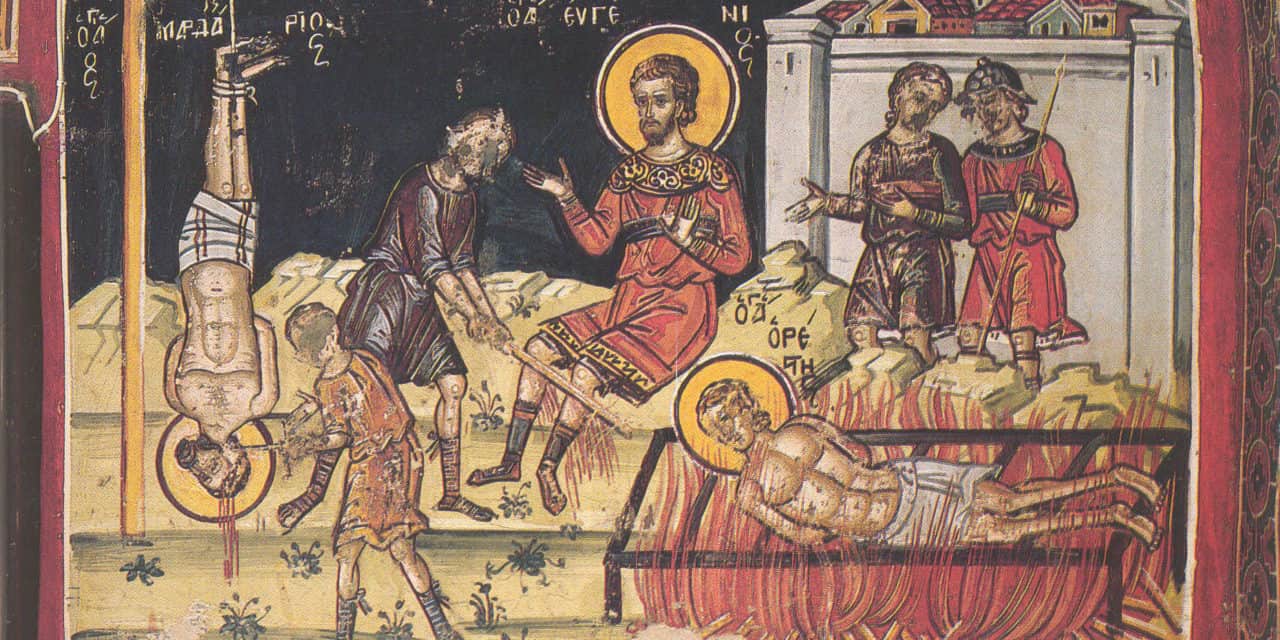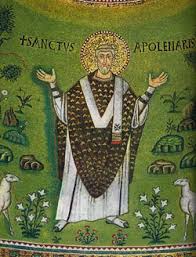This 4th Episode is titled, “Martyrs.”
Modern marketing tactics first produced, and now feed contemporary culture’s obsession for “the latest thing.” The slogan & label “New & Improved” is a frequent feature in packaging.
The opposite was the case in 1st Century Rome. That Eternal City, and really most of the ancient world, was suspicious of anything new and novel, especially when it came to ideas. They had tremendous respect for tradition, believing what was true had already been discovered and needed to be preserved. Innovation was grudgingly accepted, but only in so far as it did not substantially alter tradition.
The religion of the Greeks and Romans was sacrosanct precisely because it was ancient. Judaism, with its fierce devotion to only one God was incompatible with the Greco-Roman pantheon of gods, but it was tolerated by the Romans precisely because it was ancient.
Also, while Jews were fiercely loyal to their religion & became violent when attempts were made to convert them to paganism, they were not, as a rule, engaged in making converts of others. Judaism is not, by nature, a proselytizing faith.
Christianity’s early struggle with Rome began in earnest when Judaism officially denounced the Christians and banish them as a movement within Judaism. This took place shortly after the destruction of Jerusalem in 70 AD. Until that time, followers of Jesus were considered as a kind of reform movement within Judaism. But toward the end of the 1st Century, Rome realized the Jews had divorced themselves from the Christians. Christianity was something new; a religious novelty; so, under suspicion.
And whereas Judaism tended not to proselytize, Christians couldn’t help winning others to their Faith. This brought Christianity into close scrutiny by the authorities. The more they investigated, the more concerned they grew. Like the Jews, Christians believed in one God. But their God had become a man. Christians had no idols, practiced no sacrifices, & built no temples. These were yet more religious innovations that fired suspicion. The Christians seem to be so reductionist in their practice they were suspected of being, get this à Atheists.
As we saw in the previous episode, the paganism practiced by most people of the Empire in the 1st & 2nd Centuries wasn’t so much a heart-felt devotion to the gods as it was a sense of civic duty. “Respect the gods by visiting their temples with the proper offerings, or, suffer their wrath.” à Well, every new convert to the Christians meant one less pagan throwing their appeasing bones to the watchful & increasingly upset gods. People began to worry the growing neglect of the gods would lead to trouble. And indeed, whenever a drought, flood, fire, or some other catastrophe ensued it was inevitably blamed on “Those atheists = the Christians.”
“Christians to the lions,” became a frequent solution to the ills of the world.
The concern of the pagans was ill-attributed, but well-founded. Not because their gods were angry, but because in some places so many had become Christians the pagan temples were nearly empty. Acts 19 tells us this happened in Ephesus and a letter from the Governor of Bithynia in the early 2nd Century repeats the concern. This led to a growing call for punishment of the Christians. A few would be rounded up and put to death to prove to the gods the earnestness of the pagans to appease them.
Other factors that encouraged hostility towards believers was their secrecy. A description of Christians by Pliny, the Roman governor of Bithynia, to the Emperor Trajan in AD 111 is enlightening. Pliny had already executed some Christians based on little more than their scandalous reputation. He’d given them an opportunity to recant but when they refused, Pliny saw this rebuff of his mercy as a provocative stubbornness worthy of punishment. But after a flurry of executions, Pliny had 2nd thoughts: Was the mere reputation of Christians dangerous enough to warrant their arrest and trial? So he wrote his friend, the Emperor Trajan, asking for advice. Here’s a quote from Pliny’s letter. After describing some ex-Christians who recanted their faith, Pliny gives their report on what their practice had been when they were still Christians.
“They affirmed the whole of their guilt was that they were in the habit of meeting on a fixed day before it was light, when they sang in alternate verses a hymn to Christ as to a God, and bound themselves by a solemn oath, not to commit any wicked deeds; no fraud, theft or adultery, never to falsify their word, nor deny a trust when they should be called upon to deliver it. After which it was their custom to separate, then reassembled later to partake of food — but food of an ordinary an innocent kind.”
A little later in the letter Pliny adds that to verify this report he secured through the torture of 2 slaves that this was an accurate description of Christian meetings and that nothing more needed to be added. Pliny called Christianity a “depraved and excessive superstition.”
Emperor Trajan replied to Pliny’s request for guidance on how he wanted the growing Christian-crisis in Bithynia handled. Trajan replied . . .
“You observed proper procedure, my dear Pliny, in sifting the cases of those who had been denounced to you as Christians. For it is not possible to lay down any general rule to serve as a kind of fixed standard. They are not to be sought out. If they are denounced and proved guilty, they are to be punished, with this reservation, that whoever denies that he is a Christian and really proves it–that is, by worshiping our gods–even though he was under suspicion in the past, shall obtain pardon through repentance. But anonymously posted accusations ought to have no place in any prosecution. For this is both a dangerous kind of precedent and out of keeping with the spirit of our age.”
Though seemingly harmless to us, it was Pliny’s reference to the Christians “meeting before dawn” that proved a problem. While it looks to us a commendable reference to their diligence & earnestness, it was highly suspicious to Romans. As a rule, meetings during the dark hours were forbidden. Day was the time for meetings. To meet at night was suspect. No good could come of it. You met at night because you had something to hide.
So why DID Christians meet before daylight if it raised suspicions?
The answer lies in the composition of their Fellowship; that is, who attended. For the most part, they were commoners and the poor who had jobs they had to begin early. The only time available to meet was before the workday began.
These early meetings of the church were only open to Christians. Secrecy tends to breed gossip. It didn’t take long till wild rumors were going round about the abominable things the Christians must be doing. Their communal meal, called the Agape or Love-Feast, was recast by gossip as a wild and debauched orgy. Communion was said to be ritual cannibalism. But the real shocker was that when Christians met, social distinctions like rich and poor, slave and free, male and female, were subsumed under an appalling equality. Many critics of Christianity saw this as a dangerous subversion of the natural order. Christians were cast as radical revolutionaries out to turn the entire world upside down.
For a society that lived in constant fear of a slave uprising, anything seen as encouraging slaves to think independently was deemed perilous. Don’t forget that for the Romans, the 3 Servile Wars, the last & most perilous led by the famous Spartacus, were still potent in the collective memory, though it had ended over a century before.
Another source of trouble for Christians was their Jewish origin. Even though Judaism worked hard to distance itself from the followers of Christ, in the mind of the average Roman, the Church was a Jewish thing. In many places, Jews were the main accusers of Christians to the authorities. But this failed to dislodge Christians from their Jewish roots. The bloody and troubling Jewish Wars of the 1st & 2nd Centuries created great hostility between Romans and Jews, which spilled over onto Christians.
During the 2nd & 3rd Centuries, believers were arrested and executed on no worse crime than being accused of being a Christian. Hauled before a judge, they were given the opportunity to recant. They could do so by invoking the names of some pagan deities, offering a sacrifice to the image of the Emperor, and cursing Christ. If they refused this threefold evidence of being a pagan, they were led off to execution.
One story is illustrative. In the mid-2nd Century during the reign of the Emperor Antoninus Pius, a woman became a Christian. Marital problems led to her divorce. Resenting her, the ex-husband accused her of being a Christian. She was arrested, along with her pastor, for being a co-conspirator with her in causing the changes that caused the divorce. The pastor’s name was Ptolemaeus.
The jailer was cruel & tried to force Ptolemaeus to turn from his faith. Ptolemaeus resisted and the day of his trial arrived. The judge, Urbicus, put it straight to him, “Are you a Christian?” Ptolemaeus admitted he was. Urbicus pronounced him guilty and Roman justice being swift, he was led off to immediate execution.
As he was being led away, a spectator, Lucius by name, rose to speak. He challenged Urbicus’ decision. Lucius asked, “Why did you pass such a sentence? Was this man convicted of a crime? Is he an adulterer, a murderer, a robber? All he did was confess that he was a Christian!”
The judge replied, “It seems you are also a Christian.”
Lucius answered, “Yes, I am.”
Urbicus had the guards seize & haul him off to be executed along with Ptolemaeus.
At this, a 3rd man rose, issuing a similar challenge. When Urbicus asked if he was also a believer the man admitted both his faith and disbelief that death could ensue for no more reason than identifying w/a name. But the point is this: Urbicus believed he was well with in his authority to execute all 3 of these men for no more reason than that they claimed to be Christians.
This story, duplicated thousands of times throughout the Empire during the 2nd & 3rd Centuries drives home the fact that Christianity was poorly understood by the pagan world.
There’s no sure way to know how many believers were put to death during the first 3 centuries. Rome didn’t follow a consistent policy of persecution. Some emperors were lenient while others practiced virulent opposition. Ten of the emperors enforced an official policy of oppression & persecution; from Nero in AD 64, to the worst under Diocletian & Galerius in the opening years of the 4th Century. And even though some emperors enforced opposition to Christianity, their policies were rarely empire-wide. It was up to the provincial governors to implement the rule; many simply ignored it, seeing it as bad policy.
Though estimating the number of martyrs is difficult, we can set it somewhere between 1 & 3 million over a period of about 250 years.
Despite the threat of death, the Church continued to grow. As one oft-quoted church father put it, “The blood of the martyrs is the seed of the Church.” While the authorities remained ignorant of what Christians believed, many of the common people discovered what it was from conversation with them à and found it attractive. More than attractive, it was convincing, compelling, persuasive. They also came to faith, knowing that doing so might lead to the ultimate test.
As the years went by and Christians were made the object of public shame by using them for entertainment in the gladiatorial games, more & more began seeing their neighbors and friends on the sand, waiting to be ripped apart by wild beasts. It became personal. And pagans who knew the martyrs to be level-headed, reasonable people of solid moral standing began to question the policy of Rome to hunt such people down.
Slowly but surely a sea change began to swing public opinion away from persecution. By the dawn of the 4th Century, sympathy had eased the hatred of Christians whose resolute faith in the face of prolonged suffering had recast many as heroic.
Shifting back in time now to the late 1st Century, let’s take a look at 3 Church leaders who followed immediately after the Apostles; Clement of Rome, Ignatius, & Polycarp. These 3 come from a group of Church leaders known as the Apostolic Fathers.
Toward the end of the 1st Century, the passing of the original Apostles created a problem: Who would now lead the Church? Christians understood Jesus as the true head of the Church; but His lead was expressed through His direct disciples & those who’d been witnesses to His resurrection. Though recurring persecution was a consistent theme, the Church continued to grow. Who would guide it after the Apostles? A group now known as “the Church Fathers” provided that crucial next phase of leadership.
Though Jesus warned His followers against giving any man the role of being a spiritual authority in contest with God, the label “father” was given to elders & leaders as a term of endearment & affection. The Apostolic Fathers weren’t Apostles; they were just, you know = apostol—ic. Or may I make up a word and say they were apostol—ish. This came of their being the followers & students of the original Apostles who enjoyed a close relationship with them.
The writings of the Fathers reveals a remarkable devotion to the Jewish Scriptures of the Tanach; what Christian now refer to as the OT. Reflecting the influence of the original Apostles, the Fathers understood Christianity, not so much as a new religion but as the fulfillment of the Faith of the Jewish Patriarchs & Prophets. They took this as a given; so there’s little attempt to define new doctrine in their writing. Their purpose was more to provide edification, correction, and comfort. We could say their work was devotional in flavor. It was pastoral, seeking to bolster the hope, faith & practical holiness of those they addressed.
The Apostolic Fathers served at a time when the Church was growing dramatically & provided a radical alternative to the tired paganism that still dominated, but was slowly losing its grip on the Roman World. Their writings often honored martyrdom, occasionally elevated celibacy & laid great emphasis on baptism which the Early Church used as the singular mark of identifying as a follower as Jesus.
The first Apostolic Father we’ll look at is Clement of Rome.
Clement was born about ad 30 & served as the pastor of the church at Rome the last 9 years of his life, dying in the year 100. Paul mentions a Clement in Phil 4:3 and there’s a good chance this is the same man. Though he’s listed in the official records of the Church at Rome as the 2nd or 3rd Pope, that early in Church history there simply was no Pope, just the pastor of the church there.
Clement is best known for the letter he sent the Corinthian church, dealing with some of the same problems the Apostle Paul spoke to in his correspondence with them. The Corinthian church was fractured into warring camps Clement tried to reconcile by reminding them of the priority of love, along with the call to patience & humility. What’s notable about Clement’s letter is the strong emphasis he placed on the need for Christians to honor & comply with their spiritual leaders as a way to maintain unity.
Clement’s Letter to the Corinthians is the earliest piece of Christian literature outside the NT. For that reason, it’s of great importance to scholars as it gives us an idea of the mindset of Christian leaders and their view of the emerging faith.
Clement quotes the OT often. He also makes numerous allusions to the writings of Paul, revealing how influential and well-accepted Paul’s letters were even at this early date. In his insistence that believers honor their spiritual leaders, he bases his appeal on a line of reasoning, the subtext of which, points to a widely accepted spiritual principle. It was this à Pastors & Church leaders had received their authority from the Apostles, who’d received their authority from Christ. Much later, the Church at Rome would greatly expand on that idea of succession. But nothing in Clement’s letter gives substance to the idea that the church at Rome had jurisdictional power over other churches or over the Faith in general.
The next Father is Ignatius, considered a giant among the Apostolic Fathers because of his martyrdom. Though the pastor of the church at Antioch in Syria, he was arrested & taken to Rome. During the journey, Ignatius passed through several cities where he was allowed to address the believers. In about AD 110 he wrote letters to 6 of these in which he stressed unity & how to combat heresy. The heresy Ignatius spoke of was an early form of Gnosticism. The remedy for dealing with heresy, & the surest support for unity, Ignatius said, was the presence of a strong pastor who could provide spiritual leadership.
It’s a fairly reliable tradition that Ignatius was a student of the Apostle John & was affirmed in ministry by him. Ignatius was martyred in Rome, in the Colosseum by being fed to the beasts, during the reign of Trajan, in AD 108.
What makes Ignatius’ writings important is his emphasis on the role of a single elder-pastor as the one to lead a local church. While there are hints at this in the NT, there’s also a picture of multiple-elders who jointly share leadership. It’s more by inference drawn from Paul & Timothy’s ministry that one may see the emergence of a lead elder who becomes what we might call the senior pastor. Ignatius’ letters spell this out and make a strong case for it. He called the elders & deacons to follow the lead of that one among them God had set His anointing on to lead the church.
The 3rd Apostolic Father we’ll look at sounds like a plastic fish.
Polycarp’s story is fascinating. He also was a student of the Apostle John who became the lead-pastor at Smyrna, one of the cities to receive one of the 7 letters dictated by Jesus in Revelation. Polycarp wrote a letter to the Philippian church about ad 110 that’s filled with quotations from the OT & references to several other books that would later be included in the NT canon. Polycarp’s reliance on these books as describing the norms & beliefs of Christians indicates the early acceptance of those books that would later be made a part of the Bible. His use of them helped later Christians decide which books ought to be a part of the NT.
Polycarp was arrested & put to death in AD 155. The manner of his death was so exemplary he was honored for generations as an example of martyrdom. When officials came to arrest him, he welcomed them into the house, asked if they’d like something to eat, and while they enjoyed a meal, went into another room where he composed himself thru prayer. When he rejoined the officers, his kind treatment shamed them in the task they’d been assigned.
One of the many remarkable things about Polycarp was his advanced age. At 86, he was quite old for those days. At his execution, the magistrate pleaded with him, based on his age, to recant & save himself. Earlier I said that recanting Christians had to go thru a 3-step process to prove their sincerity. At Polycarp’s trial, the official tried to make it easier for him & told him to simply say, “Away with the atheists!” meaning Christians, who because they believed in only 1 God, were considered god-less compared to the pagans who worshipped dozens of deities. But Polycarp knew the official’s intent & pointed at the crowd that had gathered to watch him burn saying, “Away with the atheists.”
When the magistrate pressed, pleading with Polycarp to recant his faith, Polycarp replied, “80 & 6 years I have served Him & never once did He wrong me. How then can I blaspheme my King Who saved me? Come, bring what you will.”
The official couldn’t believe his offer of leniency was being rejected & grew stern. He warned, “Bless Caesar!” Polycarp replied, “Since you vainly strive to make me bless Caesar, pretending you don’t know my real character, hear me clearly – I am a Christian! If you desire to learn of the Christian faith, assign me a day, and you shall hear.”
Now enraged, the proconsul threatened, “I have wild beasts; and will expose you to them, unless you repent.” Polycarp replied, “Bring them on.”
The magistrate fumed, “Since you despise the wild beasts, unless you repent I will tame you with fire.” Polycarp said, “You threaten me with a fire which burns for an hour, and is soon extinguished; but the fire of the future judgment, and of eternal punishment reserved for the ungodly, that — you are ignorant of. But why do you delay? Come, do what you please.”
At that, the wood that had been heaped around him was set ablaze.
The story of Polycarp’s martyrdom became a popular tale Christians shared for the next few centuries as countless more faced the prospect of dying for the Faith. Truth be told, a perverse veneration of martyrdom took root in the Church that saw not a few aspire to being put to death. When martyrs were elevated as heroes, it wasn’t long before some aspired to the station of hero and considered martyrdom a price worth paying. Sadly, they weren’t dying for Christ, so much as their own reputation & fame.






Love listening to these podcasts
Thanks Virginia
There’s more than one Pliny, i see. Really enjoying the teaching.
Among all the changes that came through the history of the Church, most seem to come from a reaction to abuses of some kind or another. The Potter is at work and always brings the right man at the right time.